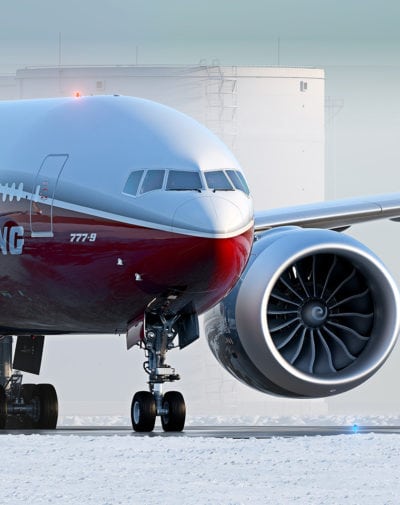
Boeing 777-9X. Photo courtesy of Boeing
Boeing has started its march toward a market that it believes is worth $2.6 trillion over the next 10 years. Boeing Global Services, the airframe manufacturer’s third major business unit, has officially opened.
The division will focus on serving aerospace and defense needs in the following four areas: supply chain management; engineering; aircraft modification; digital analytics and training; and professional services. Headquartered in Texas, the global services division was formed by the services capabilities of the government, space and commercial sectors into a single, customer-focused business.
Boeing Chairman, President and CEO Dennis Muilenburg believes aerospace services represents one of Boeing’s biggest “growth opportunities for the future.”
During a January annual earnings call, Muilenburg said one of the key focuses for the new business unit would be to expand further into data analytics and information-based services. One of the biggest examples of current services offerings in this area from Boeing is its Airplane Health Management (AHM) platform. AHM has the ability to connect aircraft ARINC 429 data streams to its graphical user interface, which can be easily accessed by an airplane mechanic via iPad or iPhone to see status updates about the health of various aircraft systems and components.
Stan Deal, who previously served as SVP of commercial aviation services for Boeing, will serve as president and CEO of the new global services division.
“We’ve been talking with our customers over the past few months as we’ve prepared for this transition, and tomorrow they can begin to see the value of this dedicated services unit that allows us to deliver agile, cost-competitive solutions so they can reduce costs, drive efficiency and ultimately optimize their operations,” said Deal.
The opening of the new services division comes as Boeing’s largest competitor, Airbus, has also focused on increasing the data analytics and aftermarket services it provides for customers. At the 2017 Paris Air Show, Airbus launched its new aviation data platform in collaboration with Palantir Technologies. Skywise is designed to bring various airline data sources such as work orders, spares consumption, components data, aircraft/fleet configuration, onboard sensor data and flight schedules into one cloud-based platform.
While the new business unit is officially open, Muilenburg said during Boeing’s first quarter 2017 earnings call in April that the new unit will not become fully operational until the third quarter. Several commercial and military operators signed up for Boeing services in the first quarter. For example, Etihad Airways signed a contract for Wind Updates, which uses Boeing developed algorithms to select wind and temperature information specific to each flight’s trajectory and considers wind conditions at a specific time. This data is individually tailored to the specific aircraft type, regardless of manufacturer, to provide optimized routing.
On the April earnings call, Muilenburg also noted that Boeing has a long-term goal of turning its current 9% market share of the global aerospace services business into a $50 billion business unit. The services division will also seek to provide analytics, modifications and other services for non-Boeing aircraft.
Last week Boeing released a forecast for future demand for aerospace services over the next decade, estimating that North America and Europe will remain the largest markets for commercial services. Asia is expected to provide the fastest growth area for aerospace services in that period.